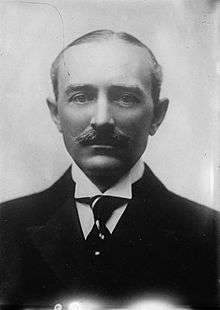Horace White
| Horace White | |
|---|---|
 | |
| 37th Governor of New York | |
|
In office October 6, 1910 – December 31, 1910 | |
| Lieutenant | George H. Cobb (acting) |
| Preceded by | Charles Evans Hughes |
| Succeeded by | John Alden Dix |
| Lieutenant Governor of New York | |
|
In office 1909–1910 | |
| Governor | Charles Evans Hughes |
| Preceded by | Lewis Stuyvesant Chanler |
| Succeeded by | George H. Cobb |
| Personal details | |
| Born |
October 7, 1865 Buffalo, New York |
| Died |
November 27, 1943 (aged 78) New York City, New York |
| Political party | Republican |
| Religion | Episcopalian |
Horace White (October 7, 1865 – November 27, 1943) was an American lawyer and politician from New York. He was the 37th Governor of New York in October 6, 1910 to December 31, 1910.
Life
He attended Syracuse Central High School, Cornell University (graduated 1887), and Columbia Law School (graduated 1889),[1] and opened the firm of White, Cheney, Shinaman, and O'Neill in Syracuse, New York in the late 1880s or early 1890s. While at Cornell he was a member of The Kappa Alpha Society.
He was a member of the New York State Senate (36th D.) from 1896 to 1908, sitting in the 119th, 120th, 121st, 122nd, 123rd, 124th, 125th, 126th, 127th, 128th, 129th, 130th and 131st New York State Legislatures; and participated in the drawing of the consolidation charter of the City of New York.[2]
He was Lieutenant Governor of New York from 1909 to 1910, elected at the New York state election, 1908 on the Republican ticket with Governor Charles Evans Hughes. Hughes resigned in October 1910 when he was appointed to the United States Supreme Court, and White succeeded to the governorship, remaining in office until the end of the year.
White served as a trustee of Cornell University from 1916 to 1943. White, who was the nephew of Cornell's first President, Andrew Dickson White, left three-quarters of his estate to the University, and that fund had grown to $1.5 million by 1973.[3] In White's honor, in 1973, Cornell named two professorships after him: the first two Cornell faculty to become Horace White Professors were Michael Fisher and Jack Kiefer.[3] He was also active in Syracuse, serving as president of the Post-Standard Company and participating in numerous other civil, social, and business organizations.[2]
White once owned Fox Island in the east of Lake Ontario, located in the Town of Cape Vincent.
He was buried at the Oakwood Rural Cemetery in Syracuse, New York.[4]
References
- ↑ Cornell Alumni News, vol. III, no. 18, Jan. 30, 1901. Archived June 10, 2007, at the Wayback Machine.
- 1 2 Horace White Papers finding aid
- 1 2 2 Professors Are Named To Horace White Chairs, Cornell Chronicle, vol. 4, no. 19, Feb. 22, 1973. Page 3. Retrieved May 30, 2011.
- ↑ Photos of burial site
External links
| Wikisource has original works written by or about: Horace White |
- Horace White Papers at Syracuse University
| Political offices | ||
|---|---|---|
| Preceded by new district |
New York State Senate 36th District 1896-1906 |
Succeeded by Joseph Ackroyd |
| Preceded by Harvey D. Hinman |
New York State Senate 38th District 1907-1908 |
Succeeded by H. S. Holden |
| Preceded by Lewis S. Chanler |
Lieutenant Governor of New York 1909-1910 |
Succeeded by George H. Cobb Acting |
| Preceded by Charles Evans Hughes |
Governor of New York 1910 |
Succeeded by John Alden Dix |
